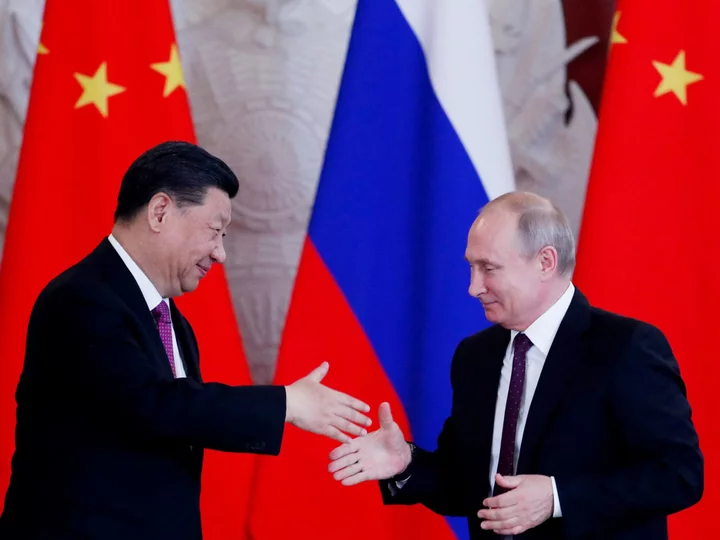Ever since Russia invaded Ukraine last year, Xi Jinping’s gamble on a “no limits” friendship with Vladimir Putin has looked like it could backfire. This weekend’s brief uprising against Moscow again underscored the risks facing the Chinese leader.
China gave a vote of confidence in Putin on Sunday, noting the Russian president’s strong relationship with Xi while saying it was necessary to “safeguard the common interests of both sides” amid a “complex and severe international situation.” Asked directly about Putin’s deal with Wagner chief Yevgeny Prigozhin, China’s Foreign Ministry said it supports Russia’s bid to maintain “national stability” in dealing with an “internal affair.”
But despite the show of support, the stunning challenge to Putin’s authority instantly raised questions about the long-term implications for Xi — from his ideological fight with the US to his own grip on power, which was questioned last year during rare nationwide protests against Covid restrictions.
“This chaotic sort of conclusion can only be seen as a loss for Beijing,” said Raffaello Pantucci, a senior fellow at the S. Rajaratnam School of International Studies in Singapore. “It highlights the fragility of its most important partner on the world stage, it highlights the weakness of a man President Xi had sought to show himself close to and, if it leads to the end of the war, then it will free up some Western assets to refocus on China.”
While Xi consolidated power last year securing a precedent-defying third term, and faces no immediate threat to his rule, his diplomatic support for Putin in the wake of the war has inextricably linked the two men. They both oversee authoritarian governments that possess nuclear weapons and oppose democratic values espoused by the US and its allies.
Even the prospect that Putin may be forced from power — a scenario that looked plausible before Prigozhin suddenly turned his forces away from Moscow — risks rippling through the establishment in Beijing. Over the weekend, a Weibo account operated by the People’s Liberation Army published a post about how Mao Zedong revamped the military in 1927 to ensure the Communist Party retained absolute control, highlighting the risk in Putin’s reliance on private armies like the one run by Prigozhin.
Although Xi has sought to consolidate his grip on China’s armed forces, it’s uncertain whether he has total command. When US President Joe Biden referred to Xi as a dictator last week, he claimed Xi was embarrassed because he didn’t know an alleged spy balloon was traveling over the US in February — an incident that prompted relations between the world’s biggest economies to spiral.
“What’s happened in Russia reinforces the message that Xi Jinping needs to continue to maintain a very, very tight grip and continue to be suspicious of the military,” said Tai Ming Cheung, director of the University of California Institute on Global Conflict and Cooperation and author of the book Fortifying China: The Struggle to Build a Modern Defense Economy.
“It’s very early days yet, but you will I’m sure see in the Chinese military press, as they come in, the cause to renew the loyalty of the military to both the Communist Party, but particularly of Xi Jinping,” he added.
As international sanctions on Russia make Xi’s relationship with Putin increasingly asymmetric, China could further press its economic advantage. Beijing has already boosted use of the yuan in trade with Russia, demonstrating its utility as an alternative to dollar dominance.
China has also bought more than $95 billion in Russian energy since the invasion, handing an important source of funding to Putin’s war machine. But becoming too dependent on Russia for energy also carries risks: RBC Capital Markets LLC analysts including Helima Croft said in a Sunday note that the threat of civil unrest in Russia must now be factored into oil analysis for the back half of the year.
While the economic costs of Putin’s invasion expose the difficulties in managing a war, they won’t necessarily deter Xi from his own military goals in Taiwan, the self-ruled island China claims as its own, according to Ja Ian Chong, an associate professor of political science at the National University of Singapore.
At the same time, it’s a reminder of what can go wrong once a war starts, said Wen-Ti Sung, lecturer at Australia National University. He cited an adage from Sun Tzu, author of The Art of War, saying that generals on the battlefield aren’t always bound by orders from the sovereign.
“Wars always carry the risk of compromising civilian control over the military,” Sung said. “So Beijing will become ever more cautious about initiating a Taiwan conflict.”
China has slowly started creating some distance with Russia over the months, warning against the use of nuclear weapons and calling for the protection of civilians after the destruction of a dam in Ukraine. Xi also sent an envoy to Ukraine in a bid to help bring an end to the conflict, although few nations see China as a neutral broker.
For now, China’s strategy seems to be publicly back Putin’s ability to rule, without tying Xi too closely to the Russian leader until the full ramifications of the weekend become clear. While China’s statements have mentioned Putin by name, Xi has still not had a public call with the Russian leader, unlike Turkey’s Recep Tayyip Erdogan and Iranian President Ebrahim Raisi.
“There is little doubt that Beijing would be carefully scrutinizing the effectiveness of Russia’s war on Ukraine and the pitfalls it has encountered to date,” said Elena Collinson, a senior project and research officer at the Australia-China Relations Institute of the University of Technology Sydney. “Russia’s strategic value as a partner to China would substantially decrease with a failed invasion of Ukraine or the ouster of Putin.”
--With assistance from Yihui Xie, Swati Pandey and Philip Glamann.
Author: Lucille Liu, Rebecca Choong Wilkins and Kari Lindberg

